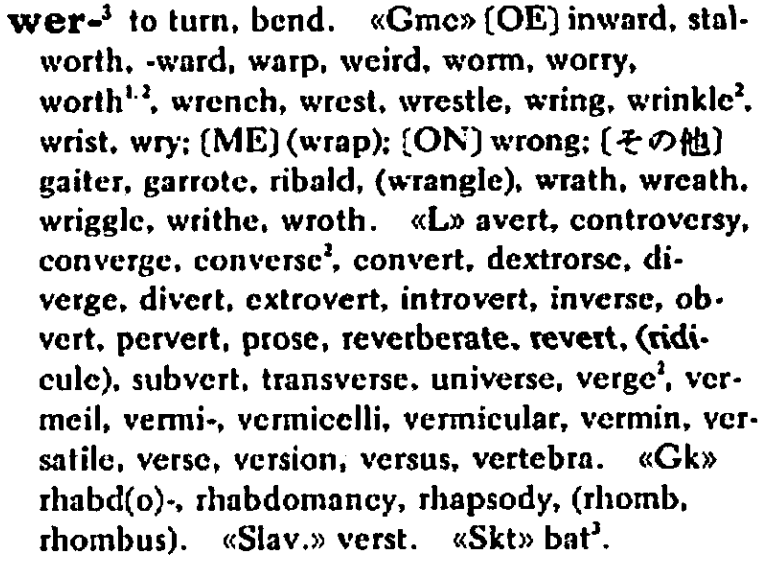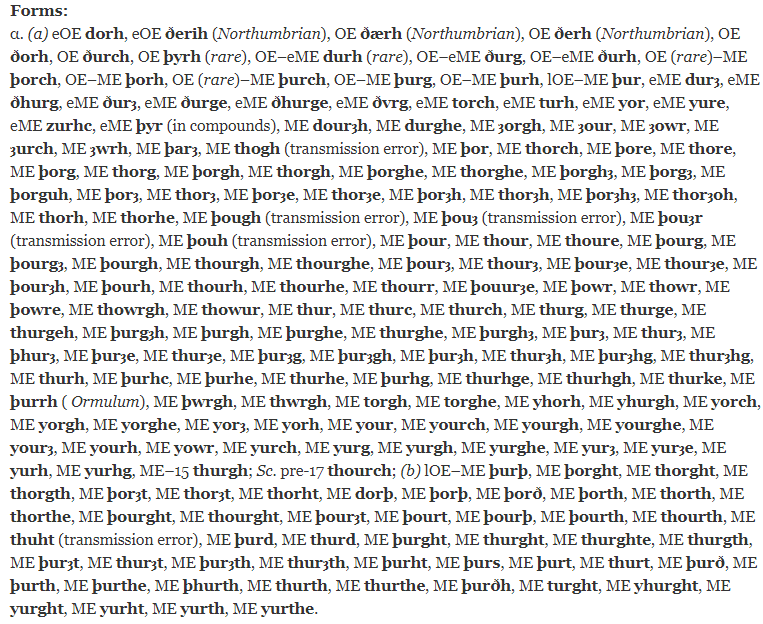Q. 次の英単語と起源の言語とを組み合わせてください.
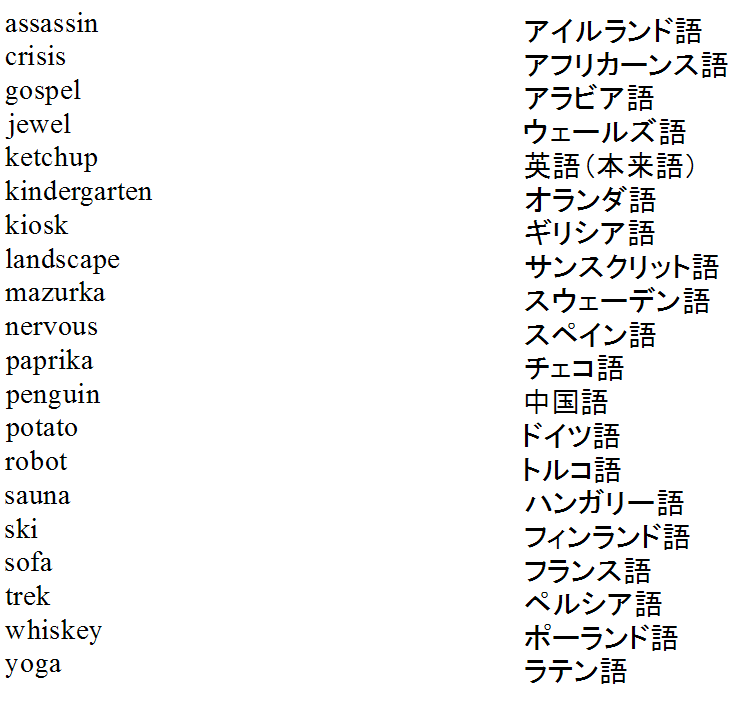
OED2 によると約46万4千語(cf. ドイツ語は約18.5万語,フランス語は約10万語)
英語本来語が1/3,ラテン語・フランス語借用語が1/3,その他の言語からの借用語が1/3
350以上の言語から語彙を借用してきた歴史
英語でも日本語でも,単語の語源という話題は多くの人を惹きつけます.一つひとつの単語に独自の起源があり,一言では語り尽くせぬ歴史があり,現在まで生き続けてきたからです.また,英語についていえば,語源により英単語の語彙を増やすという学習法もあり,その種の書籍は多く出版されています.
本講座では,これまで以上に英単語の語源を楽しむために是非とも必要となる英語史に関する知識と方法を示し,これからのみなさんの英語学習・生活に新たな視点を導入します.具体的には,
これにより,語源を利用した英単語力の増強が可能となるばかりではなく,既知の英単語の新たな側面に気づき,英単語を楽しみながら味わうことができるようになると確信します.
et・y・mol・o・gy /ètəmɑ́lədʒi|-mɔ́-/ (名UC)〔一般語〕語の起源を歴史的にさかのぼって研究する語源学,語源研究,あるいはそれにもとづいて説明される語源.
[語源]ギリシャ語 etumologia (etymon true sense of a word + logy study) がラテン語を経て中英語に入った.
【派生語】 ètymológical (形).ètymológically (副).etymólogist (名C)語源学者.
(『英語語義語源辞典』)
ety・mol・ogy
1 [uncountable] the study of the origin and history of words and their meanings
2 [countable] the origin and history of a particular word
(OALD8)
語源辞典を引き比べていると,ある単語の語源について記述に食い違いがあったり,記述に「?」が付いていたりと,語源の不確かさが目立ってくるようになる.ある段階までは文献学的な証拠に基づいて過去の意味や形態を断定できるが,それより古い段階になると情報がもやもやとしてきて何が確かな起源なのか分からなくなってくる.そこで,語源学者は自らの文献学的な知識,歴史文化的な知識,そして教養に裏付けられた鋭い直感によって,語源を暫定的に決定することになる.決定の段階では各語源学者の個性が出ることになり,この意味である種の「技芸」と捉えられるかもしれない.
語源探求は,文法など他の構造的な言語研究に従事する場合とはまったく異なる発想を要する abductive discipline である.
17世紀の辞書の登場以来,主として断片的,雑学的,百科辞典的な知識として語源情報が辞書にちりばめられていたにすぎなかったが,18世紀になって形態的な語根の同定へ関心が集中し始める.19世紀の比較言語学によって,語根の同定は科学的厳密さをもって体系的に追究され,Skeat の著作や OED の形に結実した.
通俗語源説 (folk etymology):史的言語学的に研究された語源ではなく,一般の人々が,おもに音からの連想によって,単語にこじつけた語源説。民間語源,語源俗解ともいう。特に,単語のもとの意味や語形を知ろうという一般の人々の語源意識が,ついには単語の意味や語形を変えてしまう場合にいわれる.英語の country dance (田舎風の踊り) はフランス語に入って,contre-danse と受取られ,向き合って踊るダンスの意味になった.古期英語の brȳdguma は,guma (男) という単語が廃語となってから,groom (下男) と思い誤られ,bridegroom (花婿) という形になった.(『ブリタニカ国際大百科事典 小項目版 2010』)
例:sand-blind, bikini/monokini/trikini, wedlock, bridegroom, bonfire
1 大陸時代 (--449)
1.1 ラテン語 (#1437)
2 古英語期 (449--1100)
2.1 ケルト語 (##1216,2443)
2.2 ラテン語 (#32)
2.3 古ノルド語 (##2625,2693,340,818)
2.4 古英語本来語のその後 (##450,2556,648)
3 中英語期 (1100--1500)
3.1 フランス語 (##117,1210)
3.2 ラテン語 (##120,1211)
3.3 中英語の語彙の起源と割合 (#985)
4 初期近代英語期 (1500--1700)
4.1 ラテン語 (##478,114,1226)
4.2 ギリシア語 (#516)
4.3 ロマンス諸語 (##2385,2162,1411,1638)
5 後期近代英語期 (1700--1900) と現代英語期 (1900--)
5.1 語彙の爆発 (##203,616)
5.2 世界の諸言語 (##874,2165,2164)
それぞれ中英語期,初期近代英語期を中心に,大量に英語に流れ込んだ.
| 動物名(英語本来語) | 肉の名前(フランス借用語) | 動物・肉(現代フランス語) |
|---|---|---|
| calf | veal | veau |
| deer | venison | venaison |
| fowl | poultry | poulet |
| sheep | mutton | mouton |
| swine ( pig ) | pork, bacon | porc, bacon |
| ox | beef | boeuf |
| 英語本来語(一般的) | フランス語(正式) | ラテン語・ギリシア語(知的) |
|---|---|---|
| ask | question | interrogate |
| book | volume | text |
| fair | beautiful | attractive |
| fast | firm | secure |
| fear | terror | trepidation |
| fire | flame | conflagration |
| foe | enemy | adversary |
| gift | present | donation |
| goodness | virtue | probity |
| hearty | cordial | cardiac |
| help | aid | assistance |
| holy | sacred | consecrated |
| kingly | royal | regal |
| lively | vivacious | animated |
| rise | mount | ascend |
| time | age | epoch |
| word | term | lexeme |
派生 (derivation),複合 (compounding),短縮 (shortening)
混成語 (blend) や頭字語 (acronym) の隆盛 (例:brunch, linger, motel, Oxbridge, smog; AIDS, EU, GDP, NASA, TPP)
| Old English | * Germanic vocabulary | 上代 | ○和語(やまとことば)が大部分を占めた. |
| * monosyllabic bases | ○2音節語が基本. | ||
| * derivation and compounding | ○中国との交流の中で漢語が借用された.例:茶 胡麻 銭 (なお,仏教とともに伝えられたことばの中には「卒塔婆」「曼荼羅」のような梵語(古代インド語=サンスクリット語)も含まれている.) | ||
| * Christianity-related vocabulary from Latin (some via Celtic) | 中古 | ○漢語が普及した.例:案内(あない) 消息(せうそこ) 念ず 切(せち)に 頓(とみ)に | |
| * few Celtic words | ○和文語と漢文訓読語との文体上の対立が見られる.例:カタミニ〈互に〉←→タガヒニ(訓読語) ク〈来〉←→キタル(訓読語) | ||
| Middle English | * Old Norse loanwords including basic words | ○派生・複合によって,形容詞が大幅に造成された. | |
| * a great influx of French words | 中世 | ○漢語が一般化した. | |
| * an influx of Latin technical words | ○古語・歌語・方言・女房詞など,位相差についての認識が広く存在した. | ||
| Modern English | * a great influx of Latin loanwords | ○禅宗の留学僧たちが,唐宋音で読むことばを伝えた.例:行燈(あんどん) 椅子(いす) 蒲団(ふとん) 饅頭(まんぢゅう) | |
| * Greek loanwords directly | ○キリスト教の宣教師の伝来,また通商関係などにより,ポルトガル語が借用された.例:パン カルタ ボタン カッパ〈合羽〉 | ||
| * loanwords from various languages | 近世 | ○漢語がより一般化し,日常生活に深く浸透した. | |
| * Shakespeare's vocabulary | ○階層の分化に応じて語彙の位相差が深まった. | ||
| * scientific vocabulary | ○蘭学との関係でオランダ語が借用された.例:アルコール メス コップ ゴム | ||
| Present-Day English | * shortening | 近代 | ○西欧語の訳語として,新造漢語が急激に増加する.例:哲学 会社 鉄道 市民 |
| * many Japanese loanwords | ○英米語を筆頭として,フランス語,ドイツ語,イタリア語などからの外来語が増加する. | ||
| * compounding revived | ○長い複合語を省略した略語が多用される. | ||
| * loanwords decreased |
| Language | Words |
|---|---|
| Afrikaans | apartheid, gnu, impala, indri, kraal, mamba, trek, tse-tse |
| Aleutian | parka |
| American Indian | chipmunk, moccasin, pow wow, skunk, squaw, totem, wigwam |
| Anglo-Saxon | God, Sunday, beer, crafty, gospel, house, rain, rainbow, sea, sheep, understand, wisdom |
| Arabic | algebra, assassin, azimuth, emir, ghoul, harem, hashish, intifada, mohair, sheikh, sherbet, sultan, zero |
| Araucanian | coypu, poncho |
| Australian | boomerang, budgerigar, dingo, kangaroo, koala, wallaroo, wombat |
| Brazilian | abouti, ai, birimbao, bossa nova, favela, jaguar, manioc, piranha |
| Canadian Indian | pecan, toboggan |
| Chinese | chopsuey, chow mein, cumquat, kaolin, ketchup, kung fu, litchi, sampan, tea, tycoon, typhoon, yen (=desire) |
| Czech | howitzer, pistol, robot |
| Dutch | bluff, cruise, easel, frolic, knapsack, landscape, poppycock, roster, slim |
| Eskimo | anorak, igloo, kayak |
| Finnish | sauna |
| French | anatomy, aunt, brochure, castle, cellar, challenge, chocolate, crocodile, cushion, debt, dinner, entrance, fruit, garage, grotesque, increase, jewel, justice, languish, medicine, montage, moustache, passport, police, precious, prince, sacrifice, sculpture, sergeant, table, trespass, unique, venison, victory, vogue, voyeur |
| Gaelic | banshee, brogue, galore, leprechaun |
| German | angst, dachshund, gimmick, hamburger, hamster, kindergarten, lager, nix, paraffin, plunder, poodle, sauerkraut, snorkel, strafe, waltz, yodel, zinc |
| Greek | anonymous, catastrophe, climax, coma, crisis, dogma, euphoria, lexicon, moussaka, neurosis, ouzo, pylon, schizophrenia, stigma, therm, thermometer, tonic, topic |
| Haitian | barbecue, cannibal, canoe, peccary, potato, yucca |
| Hawaiian | aloha, hula, lei, nene, ukulele |
| Hebrew | bar mitzvah, kibbutz, kosher, menorah, shalom, shibboleth, targum, yom kippur, ziggurat |
| Hindi | bungalow, chutney, dekko, dungaree, guru, gymkhana, jungle, pundit, pyjamas, sari, shampoo, thug |
| Hungarian | cimbalom, goulash, hussar, paprika |
| Icelandic | geyser, mumps, saga |
| Irish | blarney, brat, garda, taoiseach, whiskey |
| Italian | arcade, balcony, ballot, bandit, ciao, concerto, falsetto, fiasco, giraffe, lava, mafia, opera, scampi, sonnet, soprano, studio, timpani, traffic, violin |
| Japanese | bonsai, geisha, haiku, hara-kiri, judo, kamikaze, karate, kimono, shogun, tycoon, zaitech |
| Javanese | batik, gamelan, lahar |
| Korean | hangul, kimchi, makkoli, ondol, won |
| Latin | alibi, altar circus, aquarium, circus, compact, diocese, discuss, equator, focus, frustrate, genius, include, index, interim, legal, monk, nervous, onus, orbit, quiet, ulcer, ultimatum, vertigo |
| Malagasy | raffia |
| Malay | amok, caddy, gong, kapok, orang-outang, sago, sarong |
| Maori | haka, hongi, kakapo, kiwi, pakeha, whare |
| Nahuatl | axolotl, coyote, mescal, tomato, tortilla |
| Norwegian | cosy, fjord, krill, lemming, ski, slalom |
| Old Norse | both, egg, knife, low, sky, take, they, want |
| Persian | bazaar, caravan, divan, shah, shawl, sofa |
| Peruvian | condor, inca, llama, maté, puma, quinine |
| Polish | horde, mazurka, zloty |
| Polynesian | kava, poe, taboo, tapa, taro, tattoo |
| Portuguese | buffalo, flamingo, marmalade, pagoda, veranda |
| Quechuan | llama |
| Russian | agitprop, borsch, czar, glasnost, intelligentsia, perestroika, rouble, samovar, sputnik, steppe, troika |
| Sanskrit | swastika, yoga |
| Scottish | caber, cairn, clan, lock, slogan |
| Serbo-Croat | cravat, silvovitz |
| Spanish | albatross, banana, bonanza, cafeteria, cannibal, canyon, cigar, cobra, cork, dodo, guitar, hacienda, hammock, junta, marijuana, marmalade, molasses, mosquito, potato, rodeo, sherry, sombrero, stampede, supremo |
| Swahili | bongo, bwana, harmattan, marimba, safari, voodoo |
| Swedish | ombudsman, tungsten, verve |
| Tagalog | boondock, buntal, ylang-ylang |
| Tamil | bandicoot, catamaran, curry, mulligatawny, pariah |
| Tibetan | Koumiss, argali, lama, polo, shaman, sherpa, yak, yeti |
| Tongan | taboo |
| Turkish | aga, bosh, caftan, caviare, coffee, fez, jackal, kiosk, shish kebab, yoghurt |
| Vietnamese | ao dai, nuoc mam |
| Welsh | coracle, corgi, crag, eisteddfod, hwyl, penguin |
| Yiddish | chutzpah, gelt, kosher, nosh, oy vay, schemozzle, schmaltz, schmuk |
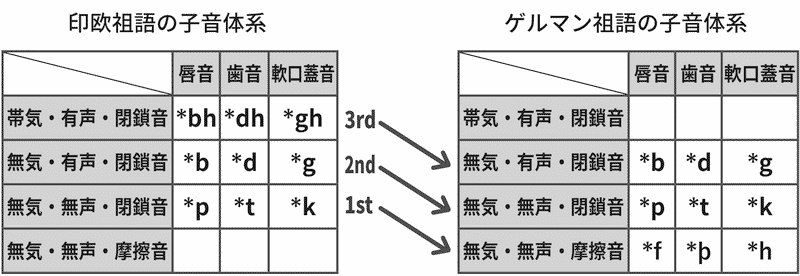
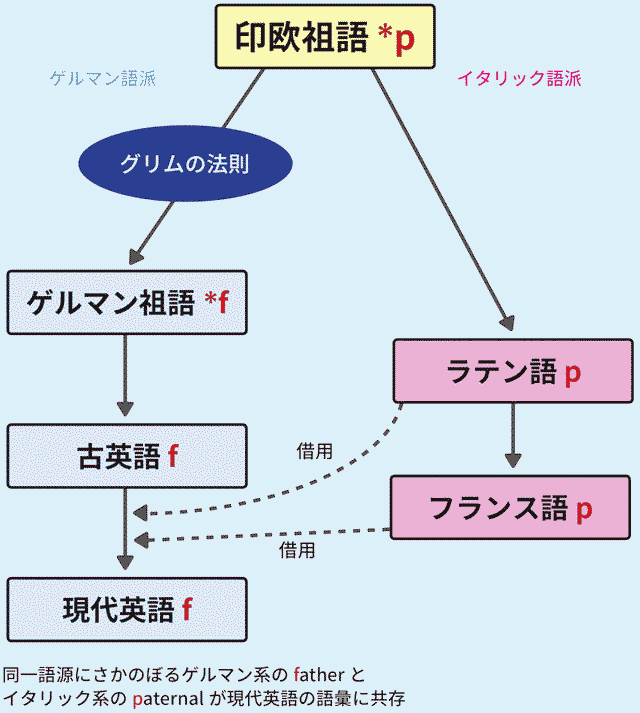
| 英語(本来語) | ラテン語・フランス語(借用語) |
|---|---|
| father (父) | paternal (父の),patriot(愛国者) |
| foot(足) | pedal(足の;ペダル), pedestrian(歩行者) |
| fee(謝礼;料金) | pecuniary(金銭の) |
| ford(瀬) | port(港) |
| fish(魚) | Pisces(うお座) |
| three(3) | trio(三重奏),tertiary(第3の),Trinity(三位一体) |
| thin(薄い) | tension(緊張),tendon(腱) |
| thunder(雷鳴) | intone(唱える;抑揚をつける) |
| hundred(100) | century(世紀,100年),cent(セント[100分の1ドル]) |
| hound(猟犬) | canine(イヌの) |
| hearty(心からの) | cordial(真心のこもった) |
| hemp(大麻) | cannabis(麻) |
| what(なに) | question(質問) |
| purse(財布) | bursary(会計課) |
| lip(唇) | labial(唇の) |
| slippery(滑りやすい) | lubricate(滑らかにする) |
| two(2) | duo(二重奏),duel(2人きりでの決闘) |
| eat(食べる) | edible(食用に適する) |
| ten(10) | decade(10年),December(12月) |
| acre(エーカー[土地の単位]) | agriculture(農業) |
| cold(冷たい) | gelid(極寒の) |
| kind(種類) | gender(性の区分) |
| brother(兄弟の) | fraternal(兄弟のような) |
| bear(運ぶ;実を結ぶ) | ferry(渡し船),fertile(肥沃な) |
| break(壊す) | fragile(壊れやすい) |
| under(〜の下に) | inferior(下級の) |
| do(行なう) | fact(事実),facile(行ないやすい) |
| garden(庭) | horticulture(園芸) |
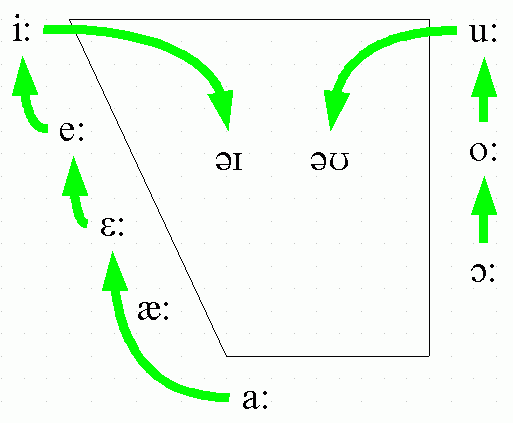
| 語 | GVS 前の発音 | GVS 後の発音 | 現代英語の発音 |
|---|---|---|---|
| find | /fi:nd/ | /fəɪnd/ | /faɪnd/ |
| keep | /ke:p/ | /ki:p/ | /ki:p/ |
| eat | /ɛ:t/ | /e:t/ -> /i:t/ | /i:t/ |
| name | /na:m/ | /nɛ:m/ | /neɪm/ |
| goal | /gɔ:l/ | /go:l/ | /goʊl/ |
| food | /fo:d/ | /fu:d/ | /fu:d/ |
| house | /hu:s/ | /həʊs/ | /haʊs/ |
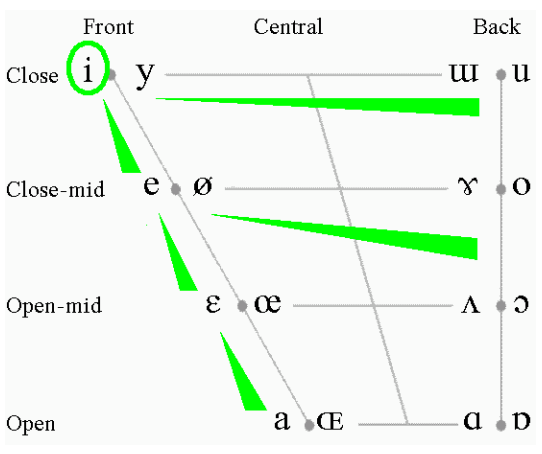
例:foot, feet; goose, geese; louse, lice; mouse, mice; man, men; tooth, teeth; brother, brethren; cow, kine; long, length; strong, strength; foul, filth; hot, heat; old, elder, eldest; blood, bleed; brood, breed, doom, deem; do, deed; fall, fell; food, feed; full, fill; gold, gild; loan, lend; loft, lift; sale, sell; see, sight; tale, tell; bought, buy; brought, bring; sought, seek; taught, teach; thought, think; fox, vixen; one, any
knight, knee; gnat, gnaw; mnemonic; pneumonia; psyche, psychology; wrist, wrong; sword; calf, half; talk, chalk; calm, palm; should, could; sign, paradigm; bomb, thumb; autumn, column; listen, soften; honest, hour
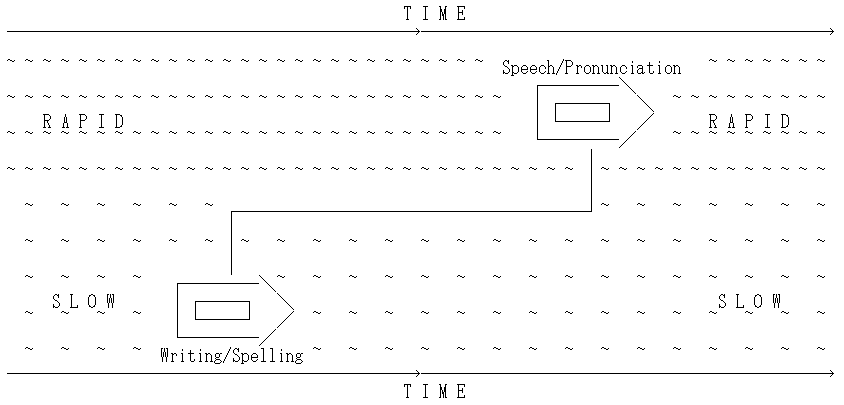
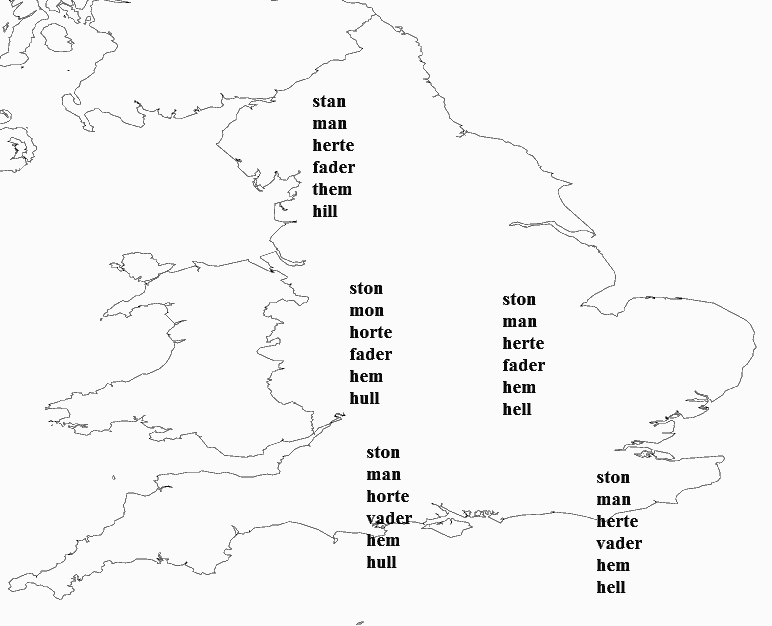
altar, Anthony, assault, author, comptroller, debt, delight, doubt, falcon, fault, indict, island, language, perfect, phantom, psalm, realm, receipt, salmon, salvation, scholar, school, scissors, soldier, subject, subtle, throne, victual
behavior/behaviour, color/colour, favor/favour, honor/honour, humor/humour, labor/labour, neighbor/neighbour, rigor/rigour; center/centre, fiber/fibre, liter/litre, theater/theatre; canceled/cancelled, chili/chilli, jeweler/jeweller, marvelous/marvellous, traveler/traveller; distill/distil, enroll/enrol, fulfill/fulfil, installment/instalment, skillful/skilful; defense/defence, license/licence, pretense/pretence; ameba/amoeba, diarrhea/diarrhoea, maneuver/manoeuvre
box, butcher, carry, crisis, holiday, sanctuary, scent
acorn, adder, hound, lust, meat, sermon, stool
admonish, corpse, cunning, hussy, judgmental, poison, villain
boy, knight, nice, queen, shrewd, steward, success
the foot of the mountain, angel, to grasp; beads, glasses, Downing Street
いずれも "very" の意味で:awful, dead, exceeding, jolly, mighty, real, terrible, uncommon; damn(ed), darn(ed), devilish, fucking, goddam, hellish
He was a happy and sad girl who lived in a town forty miles from the closest neighbor. His unmarried sister, a wife who was a vegetarian teetotaler, ate meat and drank liquor three times a day. She was so fond of oatmeal bread made from the corn her brother grew that she starved from overeating. He fed nuts to the deer that lived in the branches of an apple tree which bore pears. A silly and wise boor everyone liked, he was a lewd man whom the general censure held to be a model of chastity.
(adapted from John Algeo and Carmen Acevedo Butcher. 2005. Problems in the Origins and Development of the English Language. 5th edn. Boston: Thomson-Wadsworth, pp. 224--5.)
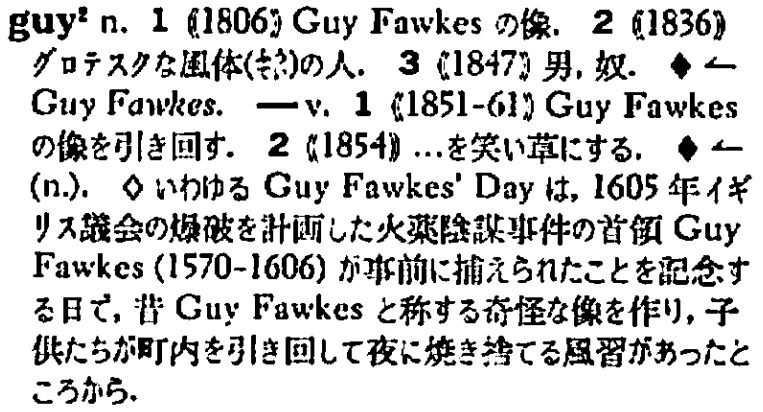
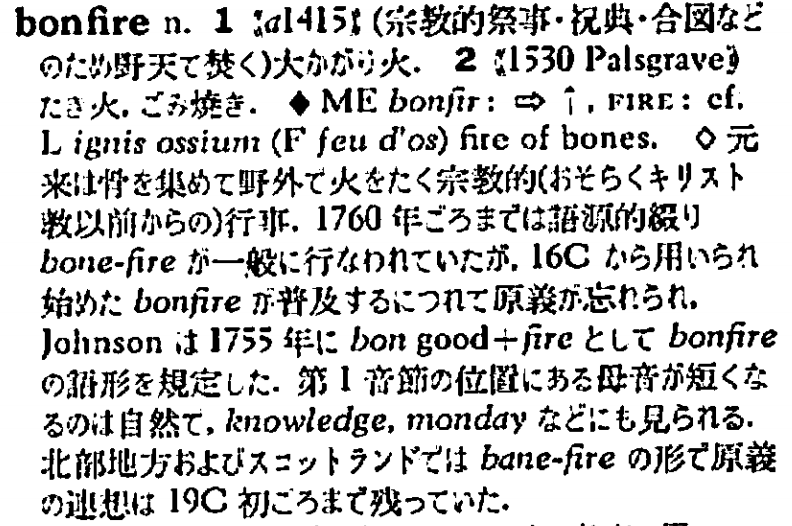
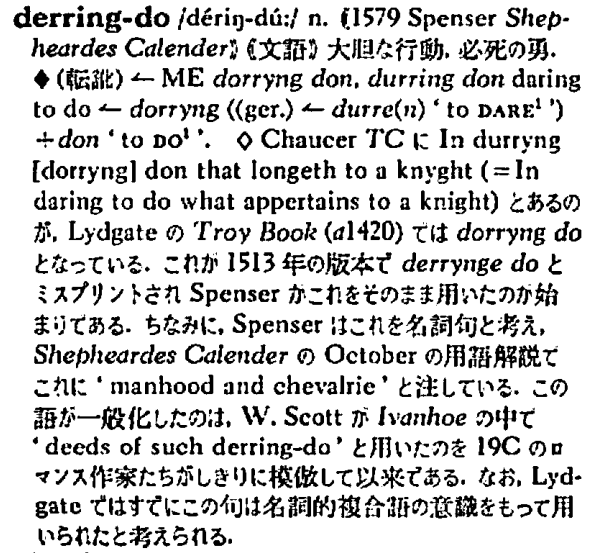
二重語とは,同じ語源の言葉が異なった経路を経て英語になった一組の言葉(あるいはその組の一語)を意味する。下記はその例に数えられるもので,それらの語源や経路をたどろうと思えば,すべて OED (『オックスフォード英語大辞典』)で見ることができ,これらの二重語から,英語の豊かさと,言葉についてのさまざまな興味ある話しを読み取ることができる。二重語には,語源は同じでありながら,その意味は互いに大いに異なるものがある。
例:aim (狙いを定める),esteem (尊重する),estimate (評価する);brother (兄弟),friar (托鉢修道士);captain (首領),chieftain (《山賊などの》かしら);disc (レコード),discus (円盤),dish (皿),dais (演壇),desk (机);employ (雇う),imply (暗に意味する),implicate (暗に示す);faculty (才能),facility (容易さ);genteel (上品ぶった),gentle (優しい),gentile (異教徒の),jaunty (陽気な);hale (健全な),whole (全体の);inch (インチ),ounce (オンス);jay (カケス),gay (同性愛の,快活な);kin (血縁),genus (《分類上の》属);locust (バッタ),lobster (ロブスター);monster (怪物),muster (召集する);naive (単純な),native (生まれた時からの);onion (タマネギ),union (結合);poison (毒薬),potion (《毒液の》一服);quiet (静かな),quit (やめる),quite (すっかり),coy (内気な);ratio (比率),ration (割り当て),reason (理由);secure (安全な),sure (自信を持って);tulip (チューリップ),turban (ターバン);utter (口に出す),outer (外側の);verb (動詞),word (言葉);zero (ゼロ),cipher (暗号)
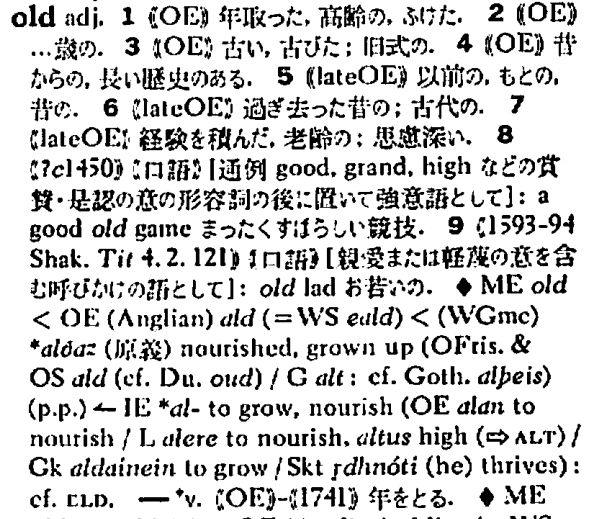
注:古英語の Anglian 方言の ald に遡るのであり,古英語形としてしばしば辞典類で標準的として言及される West-Saxon 方言の eald に遡るのではない.
